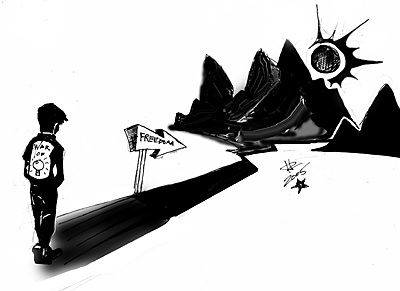
Illustration by Holly Randall
|
|
By Johathan Riches
Arizona Daily Wildcat
Monday, January 31, 2005
Print this
It is difficult not to be leery about the notion of fighting wars for ideas rather than objectives. The military is a lethal instrument, and it is supposed to be exactly that. U.S. forces are best used to accomplish clear, unambiguous missions and wars are best fought to achieve concrete objectives, not abstract ideals. However, after the rationale for invading Iraq in order to disarm Saddam Hussein of weapons of mass destruction proved erroneous, we are left with precisely that - a war for an idea. That idea is democracy. But, as it turns out, the United States has experience fighting for that high ideal.
If American experience from the last two centuries should tell us anything, it is that freedom takes time and the road to democracy is long and tough. In our own country, it took nearly 200 years to realize the noble words in our Declaration of Independence and to extend genuine freedom to all the people of this nation. It also took pain, suffering and perpetual vigilance. But, as the author of our founding document, Thomas Jefferson, wrote, "We are not to expect to be translated from despotism to liberty in a featherbed." Nor should we expect Iraq to be transformed from tyranny to liberty in either a featherbed or a time machine. What's more, for all his evils, King George was no Hussein.
The United States has fought for freedom in other nations, and the experience of these countries with democracy has been equally arduous. It took Germany nearly 45 years from the end of World War II until its reunification in 1990 to become a legitimate, consolidated democracy. The U.S. military occupied that country for nearly 11 years - from 1946 until 1955. Similarly, Allied powers occupied Japan for nearly seven years. During those post-war years, headlines across American newspapers were rife with doubt and tenaciously questioned this country's ability to transform those nations into successful republics. Today, both Japan and Germany are robust democracies, maintaining two of the strongest economies in the world.
While U.S. forces never occupied the former Soviet states of Central Europe, these countries' experience with democracy provide illuminating examples of the difficult road from totalitarianism to free government. Last September, presidential candidate Viktor Yushchenko was poisoned during Ukraine's bitterly contested presidential election. Although remnants of the Soviet regime still use despotic political tactics, the Ukrainian people exercised their power in a democratic society to change the results of a corrupt election - and bring Mr. Yushchenko to power.
The history of all free nations is a history of internal conflict, political persecution and doubt. Iraq will be no exception.
As important as the idea of democracy is to most people of Iraq, it is even more important to the terrorist insurgents in that country and others pouring in from surrounding countries. Jordanian terrorist Abu Musab al-Zarqawi has declared war on Iraq's parliamentary elections in an audiotape posted on the Internet last week. "We have declared a bitter war against the principle of democracy and all those who seek to enact it," the speaker, who was identified as Zarqawi, said. Indeed they have.
Terrorists have learned to meld images, actions and words into a potent weapon in the war of ideas. Zarqawi films the decapitation of an American hostage and posts that tape on the Internet to audiences across the world. Militarily he has accomplished nothing - at least, not in the same sense as destroying a platoon or capturing a city. But his tactics send a message, and they intimidate. As Cliff May of the Foundation for the Defense of Democracies writes: "It affects you in your living room. It is intended to shatter your will to fight; because if Americans lose their will to fight, they are, by definition, defeated."
So, it seems that both America and its adversaries are engaged in a war for ideas - the former fights to create freedom, the latter to create fear.
Yesterday's elections mark a new opportunity for progress in Iraq and for freedom in the greater Middle East. What is important now is not political rancor over the reasons for entering war. What is important is success in Iraq. That success will be achieved as the Iraqi people continue to institute free government. We should remember, however, that democracy is not a cure-all. As the election in Ukraine showed, democracies take time and they will face difficulties. But, democracy is the greatest hope for freedom, progress and human dignity of any other form of political organization on earth.
Once again, history asks the United States to fight for the great ideal of freedom. In order to carry on that fight, we must urge political cooperation and avoid partisan debate. We must show that we are not scared of terrorist tactics that seek to break our will. We owe the people of Iraq, indeed the free people of the entire world, at least that much.
Jonathan Riches is a first-year law student. He can be reached at letters@wildcat.arizona.edu.
